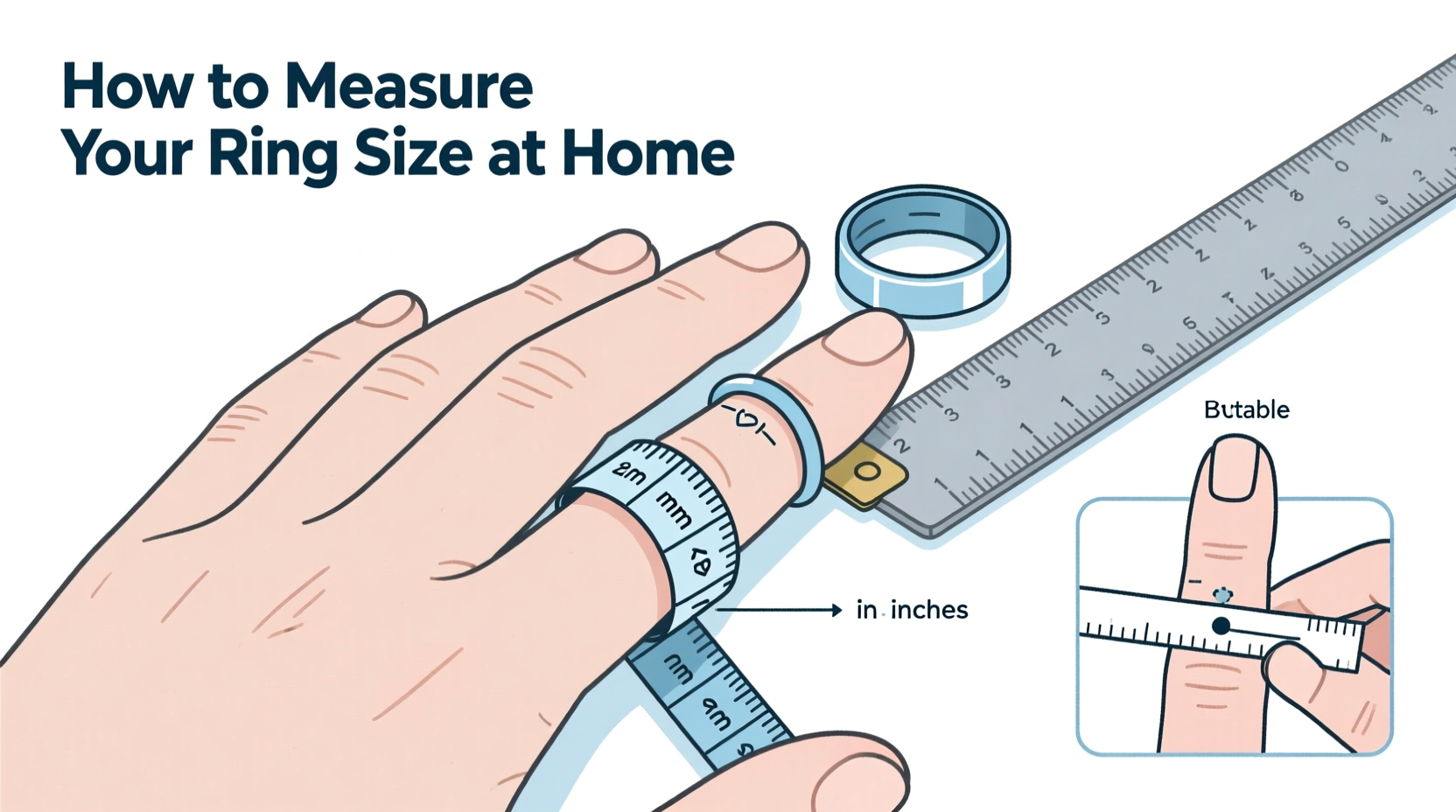Choosing the perfect open ring—whether for yourself or as a gift—requires more than just aesthetics. Fit is everything. Unlike closed bands, open rings have adjustable gaps, but that doesn’t mean sizing isn’t critical. A ring that’s too loose slips off; one that’s too tight pinches and restricts circulation. Getting it right starts with accurate measurement. Fortunately, you don’t need professional tools or a visit to the jeweler. With everyday household items and careful technique, you can determine your precise ring size from home.
Why Accurate Sizing Matters for Open Rings

Open rings, also known as tension or gap bands, rely on metal elasticity to stay in place. Their flexibility allows for minor adjustments, but they still require a foundational fit. An improperly sized open ring may lose its shape over time, fail to sit flush on the finger, or cause discomfort during extended wear. Precision ensures both comfort and longevity.
Temperature, time of day, and even hydration affect finger size. Fingers swell slightly in heat and during afternoon hours. For best results, measure when your hands are at normal temperature, ideally in the late morning or early afternoon.
Step-by-Step Guide: Measuring Your Ring Size at Home
The following method uses a strip of paper or string—a simple yet effective approach when done correctly.
- Cut a thin strip of paper (about 1/4 inch wide) or use a piece of non-stretchy thread.
- Wrap it snugly around the base of your finger—the same spot where you intend to wear the ring.
- Ensure the band is flat against the skin and not twisted. It should slide over the knuckle easily but feel secure.
- Mark the point where the ends overlap with a pen.
- Lay the strip flat on a ruler and measure the length in millimeters from end to mark.
- Use this measurement to find your corresponding ring size using a standard conversion chart.
This inner circumference gives you the exact millimeter value needed for international sizing standards. Avoid using stretchy materials like elastic or ribbon, as they yield inaccurate results.
Alternative Method: Using a Known-Fit Ring
If you already own a ring that fits well on the intended finger, leverage it for accuracy.
- Place the ring on a piece of paper and trace the inside diameter.
- Measure the diameter of the traced circle in millimeters.
- Multiply the diameter by π (approximately 3.14) to calculate the inner circumference.
For example, if the inner diameter measures 16 mm, the circumference is 16 × 3.14 = 50.24 mm. This corresponds to a U.S. size 6 or European size 50.
Ring Size Conversion Table
| U.S. Size | Inner Diameter (mm) | Inner Circumference (mm) | UK / AU Size | EU Size |
|---|---|---|---|---|
| 4 | 14.86 | 46.7 | H | 47 |
| 5 | 15.70 | 49.3 | J | 49 |
| 6 | 16.51 | 51.9 | M | 52 |
| 7 | 17.35 | 54.5 | O | 54 |
| 8 | 18.19 | 57.2 | Q | 57 |
Use this table to convert your measured circumference into the appropriate size standard based on your region or the jeweler’s system.
Common Mistakes to Avoid
Even small errors can lead to incorrect sizing. Awareness prevents costly returns or ill-fitting jewelry.
“Over 60% of at-home ring measurements fail due to material stretch or misaligned wrapping.” — Lena Torres, Master Jeweler & Sizing Consultant
- Using tape measures directly on the finger: Most are too thick and rigid to wrap accurately.
- Measuring cold fingers: Cold causes temporary shrinkage, leading to a ring that will be too tight later.
- Ignoring knuckle size: If your knuckle is significantly larger than the base of your finger, ensure the ring can slide over comfortably without being loose once seated.
- Relying on memory: Don’t assume your size hasn’t changed. Weight fluctuations, aging, and medical conditions all impact finger girth.
Mini Case Study: Sarah’s Perfect Fit Journey
Sarah wanted to surprise her partner with a handmade open silver ring. She remembered her partner wore a size 7, but when the ring arrived, it was too tight. Confused, she re-measured using a paper strip method described above. The correct circumference came out to 54.5 mm—size 7—but she realized she had wrapped the paper too loosely the first time, adding nearly 2 mm of error. After adjusting the measurement and ordering a new band, the fit was flawless. The experience taught her that consistency and precision matter more than assumed knowledge.
Checklist: How to Ensure Accurate Ring Sizing at Home
- ✅ Measure at room temperature, mid-day
- ✅ Use non-stretchy material (paper, thread, floss)
- ✅ Wrap snugly, not tightly, around the finger base
- ✅ Mark overlap point clearly
- ✅ Measure straight-line length with a ruler
- ✅ Cross-check with a known-fitting ring if available
- ✅ Consult a conversion chart for international sizing
- ✅ Repeat measurement 2–3 times for consistency
Frequently Asked Questions
Can I adjust an open ring after purchase?
Yes, most open rings allow slight bending to tighten or loosen. However, excessive manipulation weakens the metal. Always aim for the closest possible initial fit.
Do open rings fit differently than closed bands?
Yes. Open rings apply light pressure across the finger due to their spring-like structure. They should feel secure but not constricting. Because they lack a full band, they’re less likely to get stuck during swelling, making them safer for active wear.
What if my fingers are different sizes?
They often are. Always measure the specific finger on the specific hand. Dominant-hand fingers may be slightly larger due to muscle development. Never assume symmetry.
Final Tips for Long-Term Wear Comfort
Once you’ve determined your size, consider how the ring will be worn. Wide-band open rings distribute pressure differently than narrow ones. Thicker metals offer more resistance and may require a slightly larger size for comfort. Also, keep in mind seasonal changes—some people go up half a size in summer.
If giving a ring as a gift and unable to measure, opt for retailers offering free resizing or exchanges. Some jewelers provide printable ring sizers made from calibrated paper strips—more accurate than DIY methods.
“The best ring isn’t the shiniest one—it’s the one you forget you’re wearing because it fits so perfectly.” — Rafael Kim, Artisan Jewelry Designer
Take Action Today for a Perfect Fit Tomorrow
Measuring your ring size at home is simple, reliable, and entirely within your control. With the right tools and attention to detail, you can avoid the frustration of returns and enjoy your open ring with confidence. Whether you're selecting a meaningful gift or treating yourself, take the few extra minutes to measure precisely. Your fingers—and your jewelry—will thank you.









 浙公网安备
33010002000092号
浙公网安备
33010002000092号 浙B2-20120091-4
浙B2-20120091-4
Comments
No comments yet. Why don't you start the discussion?